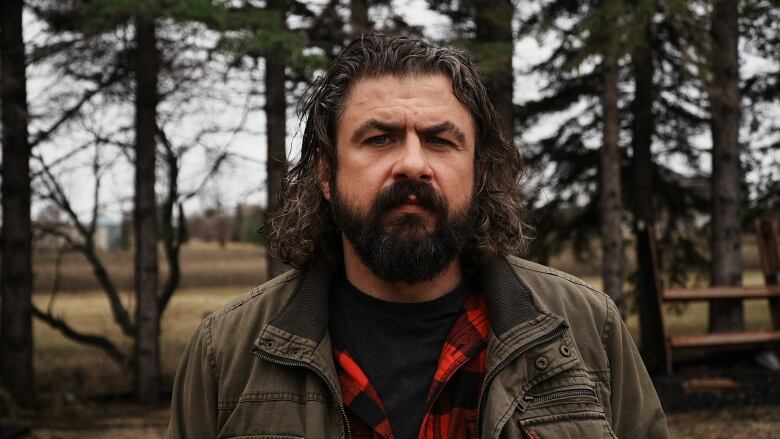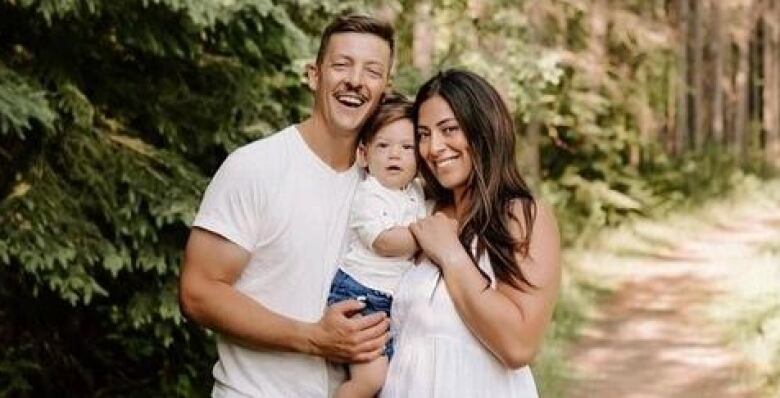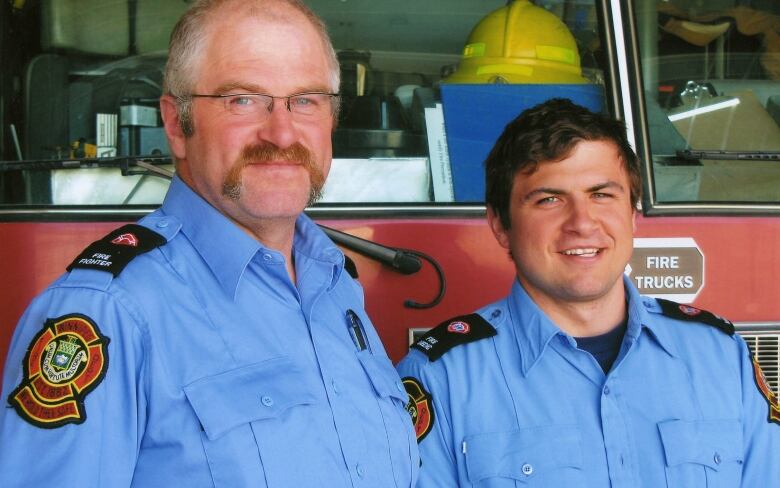First responders need better access to mental health care, former Winnipeg firefighter says
'Small pebbles can appear as boulders' for struggling people, Josh Klassen says after firefighter's death

Warning: This story contains discussion of suicide and could be triggering for some people.
The death of aWinnipeg firefighter, whose funeral will be held Friday, hassparked calls for more mental health supports for first responders.
Help is available but accessing it can be difficult, according to former firefighter Josh Klassen.
"There is hope, but the pathway to find it isn't always as clear as I would like it to be," said Klassen, who was a peer support co-ordinator for the Winnipeg Fire Paramedic Service before he left to become an arborist. He still teaches a mental health readiness program with the fire-paramedic service.
He spoke to CBC after the death of Preston Heinbigner, 40, who died by suicide on April 9. Close friends and colleagues have saidhe was struggling with post-traumatic stress disorder.
Klassen was also diagnosed and treated for PTSD just before leaving firefighting in 2020, after 17 years on the job.
He said he didn't know he was unhealthy until he told a psychologistabout a suicide call he went to early in his career.
"What I thought was normal was not healthy, and I think that's a similar story for a lot of firefighters and paramedics and first responders," Klassen said.
"We compare ourselves to each other and we think we're doing all right relative to each other, but when you actually step back you just realize how much this has affected you."

Klassen saidit's not necessarily the fires, but the nature and repetition of helping other people in crisis that takes a toll.
According to data from the Winnipeg Fire Paramedic Service,the number of total psychological claims made tothe Workers Compensation Board of Manitoba for paramedics and fire paramedics has climbed, along with an increase in calls for service.
A total of 236 claims were made in 2021 up from 132 claims in 2020 and 148 in 2019. The numberfell slightlyto 214 claims in 2022 and 201 claims last year, the fire-paramedic service said.
A number of factors may drive those calls, "including exposure to violence, burnout, and other critical incidents in the workplace," said David Driedger, the City of Winnipeg's manager of corporate communications.
"Cumulative stress is also a factor for many members," who are now responding to highercall volumes and more serious incidents, including those relatedto mental health and substance use, he said.
WATCH | Winnipeg firefighters mourn the loss of friend, colleague:
Nick Carleton, a clinical psychology professor at University of Regina who specializes in research and treatment for first responders, agrees.
"You're seeing an increase in the challenges that they're facing," Carleton said, and first responders areexposed to hundreds, if not thousands, of traumatic events over their careers.
"We have every reason to believe that if you increase the demand and increase the risk, that that's going to increase the propensity for injury, which means we're going to need to provide more support."
The Workers Compensation Boardsaid people who suffer work-related psychological injuries, including PTSD, may qualify for benefits that could cover lost wages, counselling services and other health-care costs.
Since 2016, the WCB has presumed PTSDiscaused by a worker's employment, if they were exposed to certain types of trauma while at work and diagnosed.
However, the WCB"will investigate each claim individually" to determine if it falls under that presumption or other policies, the agency said in a written statement to CBC.
It said the number of days of work lost by City of Winnipeg firefighters increased in 2022 to 898, up from 686 days in 2021, and 401 days in 2020.
While its 2023 numbers haven't been finalized, the WCB said it anticipates an upward trend.
Behavioural health unit
The fire-paramedic servicelaunched a behavioural health unit in 2021 made up of a nurse and clinical psychologist, which it says may be one factor inthe recent drop in workers' compensation psychological claims.
Anyone who goes to the unit for help may be referred to its lead clinical psychologist or an outside clinician for an assessment, treatment or therapy.
Tom Bilous, president of the United Firefighters of Winnipeg, saidthe addition of the unitis a positive step, butit needs to be expanded to make sure members can access timely care.
People looking for help are often struggling "in some dark places so by the time they reach out, they may not have three weeks or a month or six weeks or whatnot to see a psychiatrist or psychologist," Bilous said.

Klassenechoed that concern.
"The behavioural health unit is a good thing if you can make sure that you have very clear paths that when people recognize they have an issue that they can get treatment quickly," Klassen said.
But he knows people are still struggling and more needs to be done.
"When you're struggling all of those things that are just small pebbles appear as boulders, and they're barriers that stop you from getting help."

If you or someone you know is struggling, here's where to get help:
- Call ortext988. Calls and texts are directed to a network of partners in communities across the country offering suicide prevention services such as counselling.The988 serviceis available in English andFrench to all.
- Talk Suicide Canada: 1-833-456-4566 (phone) | 45645 (text between 4 p.m. and midnight ET).
- Kids Help Phone: 1-800-668-6868 (phone), live chat counselling onthe website.
- Canadian Association for Suicide Prevention:Find a 24-hour crisis centre.
This guide from theCentre for Addiction and Mental Healthoutlines how to talk about suicide with someone you're worried about.














_(720p).jpg)


 OFFICIAL HD MUSIC VIDEO.jpg)
.jpg)



























































































